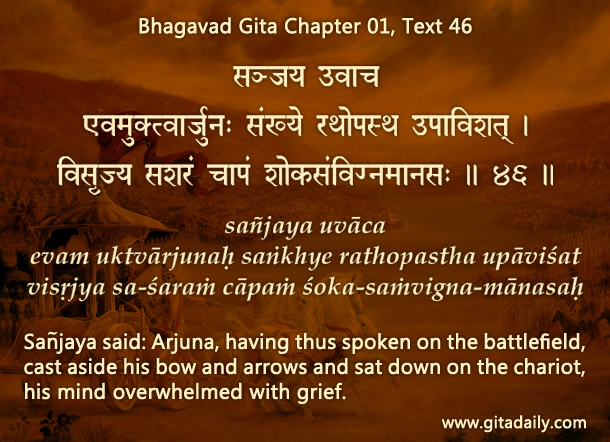From the specific to the universal and back to the specific – Well-written books exhibit an expert balance between specifics and universals, whereby the specifics engage and the universals illuminate. Let’s see how this is done in the Bhagavad-gita.
Specific situations: The Bhagavad-gita starts with a dramatic setting that captures the readers’ attention. The Gita’s first chapter provides many specifics: the names of the warriors on both sides; the war sounds and the multi-generational relatives on the battlefield; and finally the despondent Arjuna (01.46).
Universal principles: If the Gita had moved from that specific problem to a specific solution, it would have been of interest only to history buffs with a thing for ancient wars. What makes the Gita relevant even today is that it soon rises far above the specifics to universals: it deliberates issues of identity and duty, of meaning and purpose, of destiny and divinity – issues that concern all people at all times. And it proclaims as the overarching guideline the principle of love: love for God and for all living beings in their relationship with God. Because the Gita’s essential principles transcend its historical and geographical setting, the Gita can speak to us today.
Specific solutions: If the Gita had ended only with universal principles, Arjuna would have been left with valuable but abstract teachings whose specific application in particular situations would have been difficult to apply. In fact, when Krishna seemed to sign off at such a point (18.63), Gita commentators explain that Arjuna was left pensive and indecisive. Therefore, Krishna made a specific call to operationalize its concluding teaching of divine love (18.65-66), which infused Arjuna with clarity and confidence (18.73).
One-sentence summary:
The Gita engages by describing specific situations, illuminates by deliberating universal principles and guides by pointing toward specific solutions.
Think it over:
- What are the twofold characteristics of good books? How does the Gita demonstrate those?
- How does the Gita ascend to universal principles?
- How does the Gita descend to specific solutions?
***
01.46: Sanjaya said: Arjuna, having thus spoken on the battlefield, cast aside his bow and arrows and sat down on the chariot, his mind overwhelmed with grief.
To know more about this verse, please click on the image


Leave A Comment